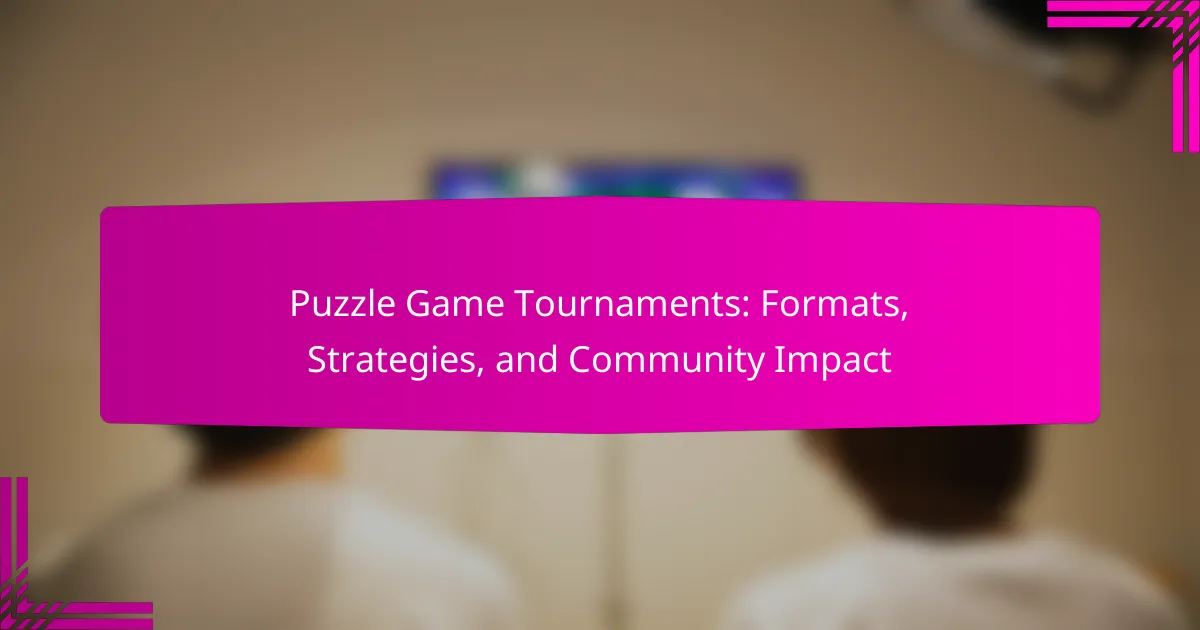Puzzle game tournaments offer players a chance to showcase their skills and engage with the community. This article explores various tournament formats, effective strategies for success, and the positive impact on local communities. It also highlights emerging trends shaping the future of puzzle gaming competitions. Understanding these aspects can enhance participation and foster a vibrant gaming culture.
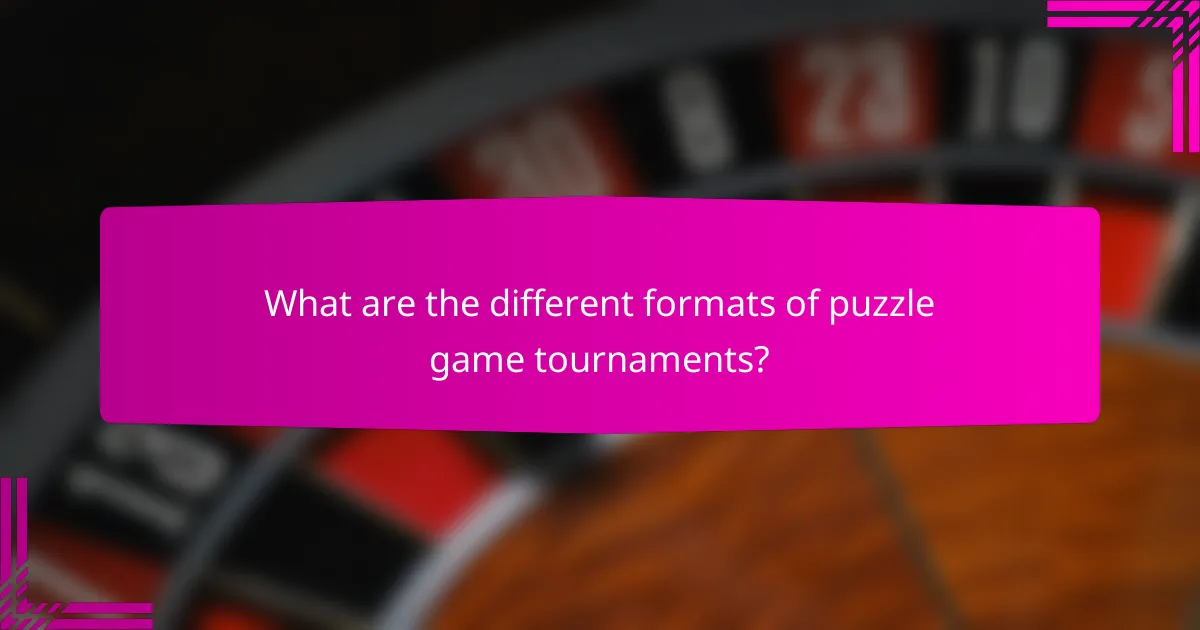
What are the different formats of puzzle game tournaments?
Puzzle game tournaments can take various formats, each catering to different player preferences and competitive styles. Common formats include single elimination, double elimination, round-robin, and Swiss system.
Single elimination features knockout rounds, where losing players are eliminated. Double elimination allows players a second chance, requiring them to lose twice to be out. Round-robin involves each participant playing against all others, promoting extensive interaction. Swiss system pairs players based on performance, ensuring balanced competition over multiple rounds.
These formats impact community engagement and player strategies, fostering a dynamic environment for both casual and competitive gamers.
How do single elimination tournaments work?
Single elimination tournaments consist of rounds where participants compete in matches, with the loser being eliminated after each match. The format typically progresses through quarterfinals, semifinals, and finals, culminating in a single champion. Each match’s outcome directly determines who advances, creating a straightforward and competitive structure. This format encourages strategic gameplay and can enhance community engagement by fostering rivalries and excitement among players.
What is the structure of round-robin tournaments?
Round-robin tournaments feature each participant competing against every other participant. This structure promotes fairness and ensures that all players have equal opportunities to showcase their skills. Typically, the tournament consists of multiple rounds, with points awarded for wins, draws, and losses. The player with the highest total points at the end is declared the winner. This format is particularly effective in puzzle game tournaments, as it fosters a competitive yet inclusive environment.
How do Swiss-system tournaments operate?
Swiss-system tournaments operate by pairing players based on their current scores, allowing for multiple rounds without elimination. Each participant plays a set number of matches, typically resulting in a final ranking based on accumulated points. This format encourages fair competition and accommodates varying skill levels. Players receive points for wins and draws, fostering a dynamic and engaging environment within puzzle game tournaments.
What are the benefits of online versus offline tournaments?
Online tournaments offer greater accessibility and convenience, while offline tournaments provide in-person engagement and community building. Online formats allow participation from anywhere, attracting a global audience. Offline events foster social connections and enhance the competitive atmosphere. Both formats can enhance player skills through varying strategies. Online tournaments often feature instant feedback and analytics, while offline tournaments provide immersive experiences with live audiences. Overall, the choice depends on player preferences for community interaction versus convenience.
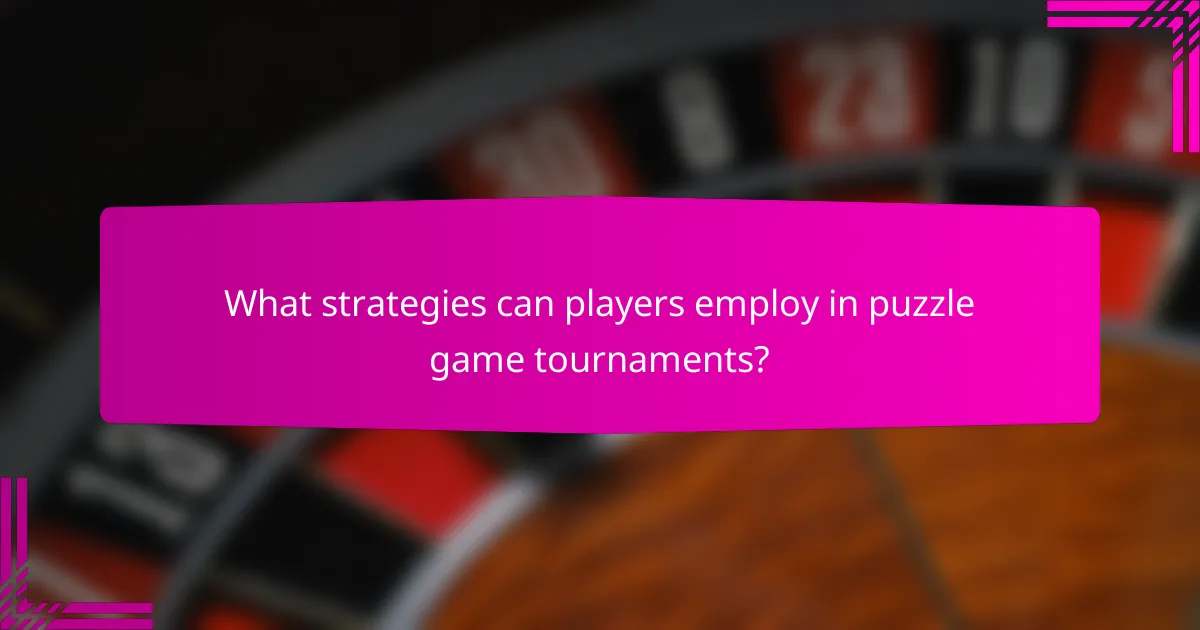
What strategies can players employ in puzzle game tournaments?
Players in puzzle game tournaments can use several strategies to enhance their performance. Prioritizing practice is essential; consistent play improves skills and familiarity with game mechanics. Time management during matches is crucial; players should allocate time efficiently to avoid rushing and making mistakes. Analyzing opponents’ strategies can provide insights into their gameplay, allowing for better counter-strategies. Additionally, maintaining focus and managing stress levels can significantly impact performance, as mental clarity is vital in high-pressure situations. Lastly, engaging with the community for tips and support can foster improvement and motivation.
Which techniques enhance problem-solving speed?
Engaging in puzzle game tournaments enhances problem-solving speed through techniques like time management, pattern recognition, and strategic planning. These skills foster quicker decision-making and effective resource allocation during gameplay.
Time management improves focus and efficiency, allowing players to allocate appropriate time for each puzzle. Pattern recognition helps identify solutions faster by recognizing common themes and strategies. Strategic planning involves anticipating challenges and preparing responses, which streamlines problem-solving processes.
Participating in diverse formats, such as knockout or round-robin tournaments, further sharpens these techniques. Players adapt to varying challenges, enhancing their cognitive flexibility and overall problem-solving speed.
How important is practice and preparation for success?
Practice and preparation are crucial for success in puzzle game tournaments. They enhance skills, improve strategies, and build confidence. Regular training helps players understand game mechanics, develop effective approaches, and adapt to various formats. Additionally, preparation fosters community engagement, allowing players to share insights and experiences. Consistent effort leads to better performance and a deeper understanding of the competitive landscape.
What role does teamwork play in multiplayer puzzle tournaments?
Teamwork is crucial in multiplayer puzzle tournaments as it enhances problem-solving efficiency and fosters collaboration. Effective communication among team members leads to quicker solutions and improved strategies. Teams can leverage diverse skills, allowing for a comprehensive approach to challenges. Additionally, teamwork builds community spirit, making tournaments more engaging and enjoyable for participants.
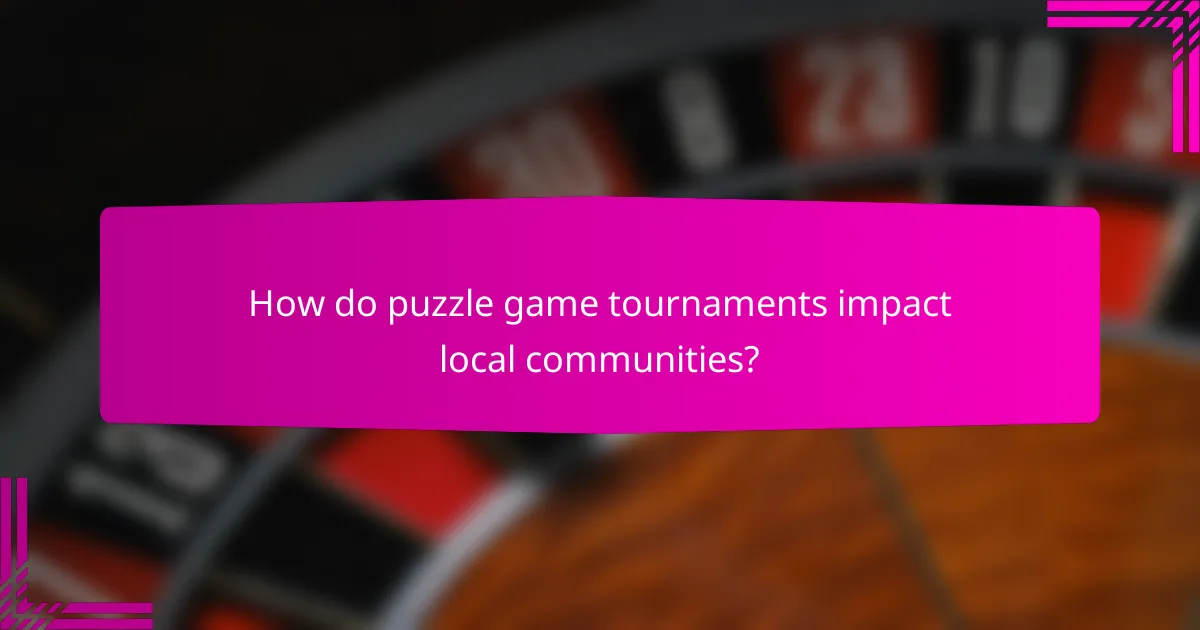
How do puzzle game tournaments impact local communities?
Puzzle game tournaments positively impact local communities by fostering social interaction, enhancing problem-solving skills, and boosting local economies. These events create a platform for players to connect, share strategies, and build friendships. As a result, participants often collaborate on community projects, strengthening local ties. Additionally, tournaments attract visitors, increasing revenue for local businesses through spending on food, lodging, and entertainment. This economic boost can lead to further community development initiatives.
What are the economic benefits of hosting tournaments?
Hosting puzzle game tournaments generates significant economic benefits, including increased local revenue and job creation. These events attract participants and spectators, boosting local businesses such as hotels, restaurants, and shops. Additionally, tournament sponsorships and entry fees contribute to the local economy. The community also gains from enhanced tourism and potential media exposure, which can lead to future events. Overall, the positive economic impact fosters community growth and development.
How do tournaments foster social connections among players?
Puzzle game tournaments foster social connections by bringing players together in a collaborative and competitive environment. These events create opportunities for networking, teamwork, and shared experiences. Players often form friendships through shared interests and challenges faced during competitions. Additionally, tournaments encourage communication and interaction, enhancing community bonds among participants. As a result, players develop a sense of belonging and camaraderie, which can extend beyond the tournament itself.
What initiatives promote inclusivity in puzzle gaming events?
Puzzle gaming events promote inclusivity through various initiatives. These include diverse team formats, accessibility measures, and community outreach programs.
Diverse team formats encourage participation from various demographics, fostering collaboration and social interaction. Accessibility measures, such as adaptive technologies, ensure that players of all abilities can compete. Community outreach programs engage underrepresented groups, providing resources and support to enhance participation.
These initiatives collectively enhance the community impact of puzzle game tournaments, creating a welcoming environment for all players.
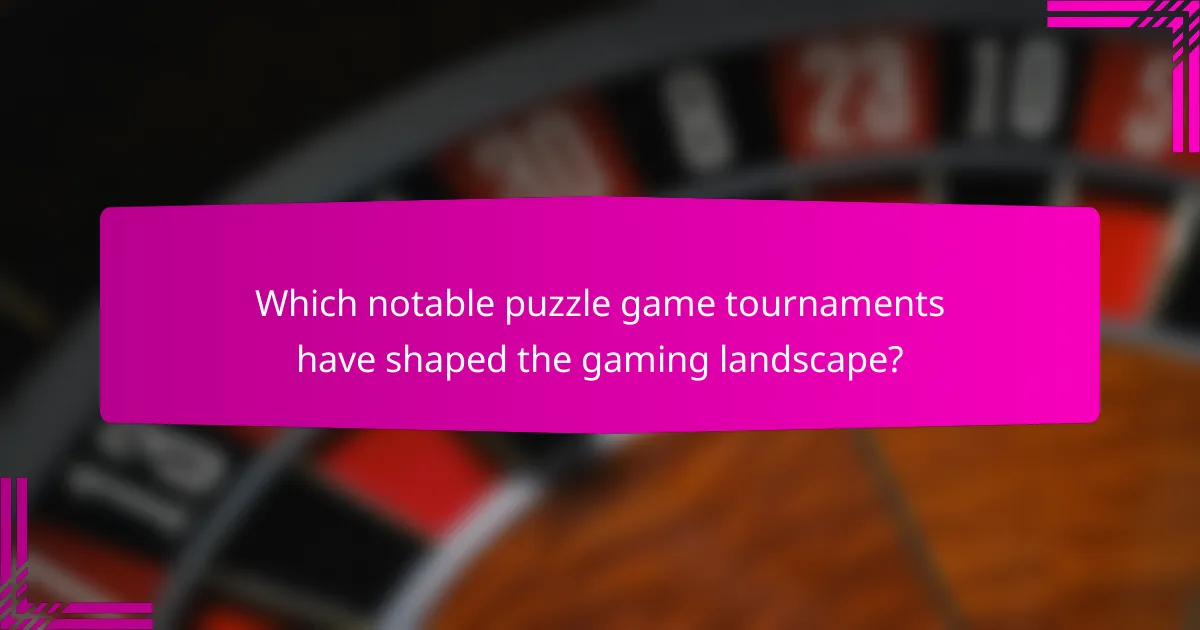
Which notable puzzle game tournaments have shaped the gaming landscape?
Notable puzzle game tournaments have significantly influenced the gaming landscape by promoting competitive play and community engagement. Events like the World Puzzle Championship and the Tetris World Championship showcase diverse formats and strategies, fostering a global community. These tournaments highlight player skill and innovation, driving interest in puzzle gaming. The impact extends beyond gameplay, contributing to the development of online platforms and collaborative gaming experiences.
What unique features distinguish the World Puzzle Championship?
The World Puzzle Championship is distinguished by its unique format, diverse puzzle types, and international participation. It features a combination of individual and team events, promoting collaboration and competition. The tournament includes a variety of puzzles, such as crosswords, Sudoku, and logic puzzles, appealing to a wide range of problem-solving skills. Additionally, it fosters a global community, bringing together enthusiasts from different countries to celebrate puzzle-solving.
How has the Puzzle Game League influenced competitive play?
The Puzzle Game League has significantly shaped competitive play by fostering community engagement and enhancing strategic depth. Tournaments create a platform for players to showcase skills, driving innovation in gameplay tactics. The league’s structured formats promote fair competition, while its outreach encourages broader participation. As a result, the community thrives, leading to increased interest and investment in puzzle gaming.
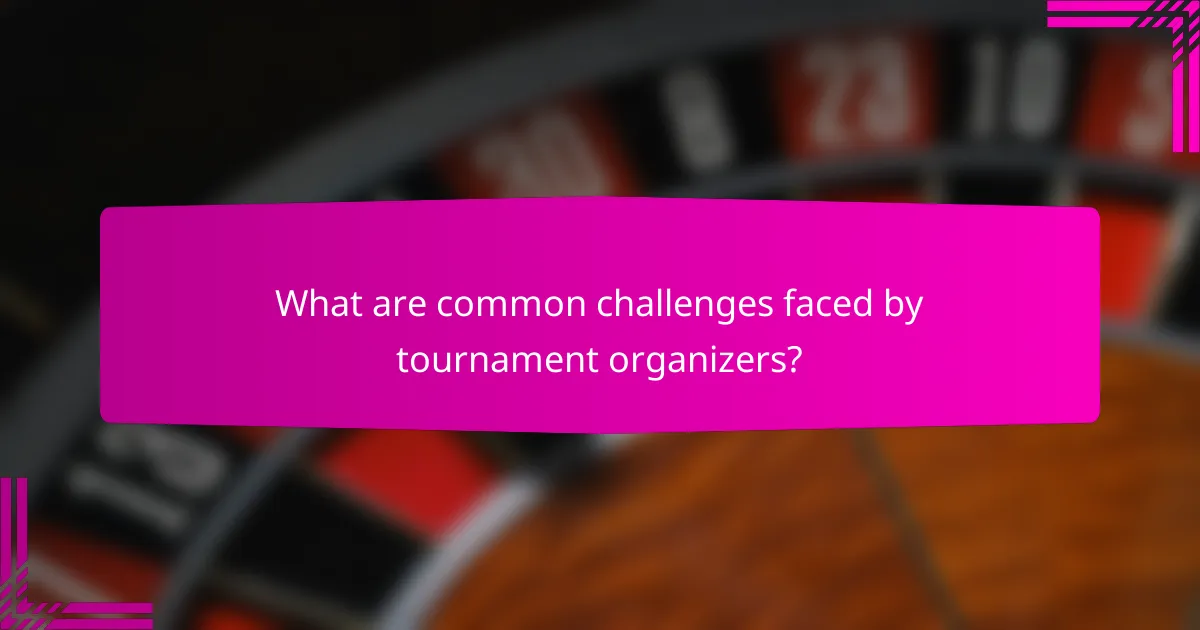
What are common challenges faced by tournament organizers?
Tournament organizers face several common challenges that can impact the success of puzzle game tournaments. These include managing participant registration, ensuring fair play, and maintaining engagement throughout the event.
Logistical issues, such as venue selection and technology setup, often arise, complicating the planning process. Additionally, attracting sponsors and funding can be difficult, limiting resources for prizes and marketing.
Community involvement is crucial; organizers must foster a welcoming environment to encourage participation. Finally, adapting to feedback and evolving game formats can pose challenges, requiring flexibility and innovation.
How can technology improve tournament management?
Technology enhances tournament management by streamlining organization, improving participant engagement, and optimizing logistics. Digital platforms enable real-time updates, registration, and communication, fostering a more connected community. Data analytics can inform strategies to boost player participation and satisfaction. Automated systems reduce administrative workload, allowing organizers to focus on enhancing the overall experience.
What strategies help in engaging participants and audiences?
Engaging participants and audiences in puzzle game tournaments requires interactive strategies. Incorporating live polls, real-time feedback, and team-based challenges fosters involvement.
Utilizing social media platforms enhances community interaction and promotes events. Offering incentives, such as prizes or recognition, motivates participation and enhances the overall experience.
Creating themed tournaments or unique formats can attract diverse audiences. Regularly updating content and incorporating player suggestions keeps the community engaged and invested.
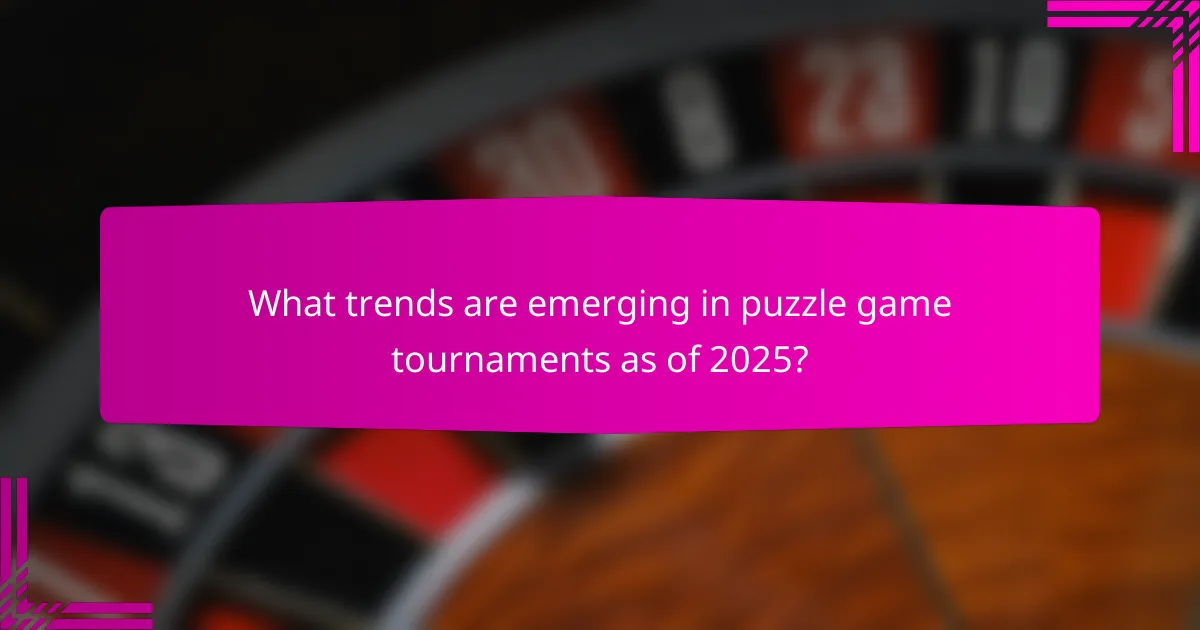
What trends are emerging in puzzle game tournaments as of 2025?
Emerging trends in puzzle game tournaments as of 2025 include increased accessibility, enhanced community engagement, and innovative tournament formats.
Accessibility has improved with online platforms allowing players from diverse backgrounds to participate. Community engagement has intensified, with social media playing a crucial role in connecting players and organizers. Innovative formats, such as hybrid tournaments combining online and offline elements, are gaining popularity, offering unique experiences.
Additionally, the integration of real-time analytics is transforming strategies, enabling players to adapt quickly during competitions. The focus on inclusivity is also rising, with tournaments catering to various skill levels and demographics.
How are mobile platforms changing the tournament scene?
Mobile platforms are revolutionizing the tournament scene by enhancing accessibility and engagement. Players can join tournaments from anywhere, increasing participation rates. Mobile games often incorporate unique formats, such as real-time competitions and asynchronous play, which cater to diverse player preferences. Community-building features, like in-game chat and social sharing, foster connections among players, enhancing the overall tournament experience. As a result, mobile platforms are not only expanding the player base but also enriching the tournament landscape.
What innovations are enhancing player experiences?
Innovations enhancing player experiences in puzzle game tournaments include real-time analytics, immersive virtual environments, and community-driven content creation. These advancements foster engagement and improve strategic gameplay. Real-time analytics provide players with instant feedback, allowing them to adjust strategies dynamically. Immersive virtual environments create a more engaging atmosphere, enhancing the overall experience. Community-driven content encourages collaboration and creativity, enriching the tournament landscape.
Which community-driven events are gaining popularity?
Puzzle game tournaments are increasingly popular due to their engaging formats and strong community ties. Various formats, such as single-elimination and round-robin, cater to diverse player preferences. Strategies like teamwork and problem-solving enhance the competitive experience. Community impact is significant, fostering collaboration and social connections among participants.
What best practices should organizers follow for successful tournaments?
Organizers should prioritize clear communication, effective scheduling, and engaging formats for successful puzzle game tournaments. Establish rules and guidelines to ensure fair play. Promote community involvement to enhance player experience. Utilize feedback for continuous improvement.
